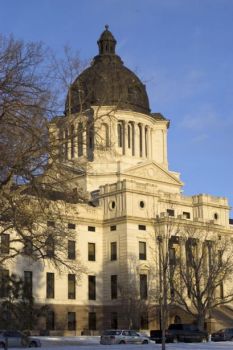The Gift of South Dakota
Subscriptions to South Dakota Magazine make great gifts!
Subscribe today — 1 year (6 issues) is just $29!
4 Yes, 2 No and a 'Present'
Nov 5, 2012
I think that the initiative and referendum process is a very bad idea. Like all the other states, South Dakota elects a governor and a state legislature. We expect them to do only three simple things:
- provide generous services to the people of this state;
- keep taxes very, very low; and
- balance the state budget.
That looks a lot like my personal weight loss program: everything is on the table except dieting and exercise.
Giving the legislature an almost impossible task would make it too easy on them. So we also keep tying their hands by referendums and initiatives. There is one big problem and another bigger problem with this. The big problem is that we frequently use the state constitution to make policy. That is a little like trying to put the arrangement of furniture into a blueprint. A constitution should spell out the rules of governing; it should not be a means to fix legislative outcomes.
The bigger problem is that initiatives isolate a particular question from its effect on the rest of the laws and the budget. When the legislature decides to spend money on something, it has to face the fact that that money cannot be spent on something else. When the voters decide to spend money on a particular issue in an initiative, they are sheltered from that reality. This makes for irresponsible policy.
I find that these reflections make it a lot easier to decide how to vote on the various ballot issues. I apply them in the following analysis of this year’s ballot.
Yes on Amendment M. The state constitution is not the place for restrictions on laws governing corporations. Since M removes such restrictions, yes is an easy call.
Yes on Amendment N. A five cents per mile constitutional restriction on travel reimbursement for legislatures (enacted in 1889!) is an absurdity. Again, this has no business being in the state constitution. We should remove the restriction.
Yes on Amendment O. I don’t think that cement is a constitutional issue so I would rather see the business taken out of the state constitution. Amendment O replaces a dollar amount with a formula, which is at least a mild improvement.
No on Amendment P. A balanced budget is necessary for any government that cannot print money, and maybe for those that can. There is neither any need nor any use in stating the obvious in the state constitution.
So much for the alphabet issues. Now for the sexier, numerical issues.
Yes on Referred Law 14. The governor and the legislature created a “Large Project Development Fund,” which I suppose is intended to allow the Governor to encourage the development of large projects. I have no strong feelings about such a fund and neither do you. Or if you do, vote against the rascals who enacted it. Reversing the legislature’s work shields them from your criticism and shields you from having to find out how your representative voted.
Referred Law 16. I am going to weasel out on this one. On the one hand, the legislative package that is referred to the voters here looks like a very big solution chasing a very small problem. On the other hand, anything that my South Dakota Magazine colleague Cory Heidelberger is so vehemently opposed to can’t really be a bad idea. Much as I disapprove of the referendum process, it exists and I would vote against something I disliked as much as Cory dislikes this one. So I am taking the sub-courageous course of voting “present” on this one.
No on Initiated Measure 15. If you think that taxes should be raised and more money should be spent on education and Medicaid, I might agree with you. What both of us should do is talk to the people we send to Pierre and vote accordingly. Taxing and spending on such issues is something that should only be done with an eye to the state budget as a whole. That is what we pay our legislators to do. If we are going to bypass the legislature and create pools of money for specific purposes, why bother to fund a legislature at all?
We give our legislature an almost impossible task and yet they manage to accomplish it. South Dakota is a well-managed state, fiscally speaking. Let them do their job and then fire the rascals if you think they haven’t done it well enough. Meanwhile, let’s clean up the state constitution.
Editor's Note: Ken Blanchard is our political columnist from the right. For a left-wing perspective on politics, please look for columns by Cory Heidelberger every other Wednesday on this site.
Dr. Ken Blanchard is a professor of Political Science at Northern State University and writes for the Aberdeen American News and the blog South Dakota Politics.










Comments
Cory: No, I don't always vote the opposite way you do. I am rather inclined to vote no on 16 for reasons I indicate above. Two things made me hesitant to say so. One is my distaste for overruling the legislature by referendum. Another is the many anti-16 posts on your blog. You seem so vehemently opposed to anything that would inconvenience teachers without suggesting any more reasonable alternatives. That is doing your cause no favors.